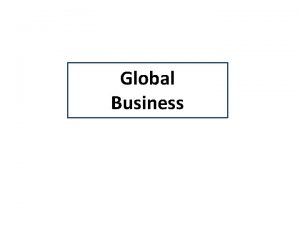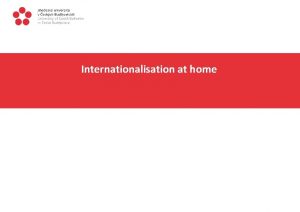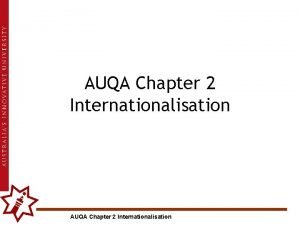9 3 Assessing internationalisation Reasons and factors influencing














- Slides: 14

9. 3 Assessing internationalisation Reasons and factors influencing operating in international markets and off-shoring and re-shoring

Learning outcomes You should be able to understand: • Why businesses trade internationally and the factors influencing their choices and how they can enter those markets • Why businesses may produce or source products internationally and their influences

Overview of key concepts • Growing a business by entering international countries can give a business access to new customers and new markets. • However, an international business is fraught with risks, both in terms of reputation and finance.


Why become an international business? • Achieving growth – it may be difficult to continue growing in a domestic market because of competition saturation or a limited customer base, so businesses look to grow and expand into different markets aboard. This can also help increase market share • Boosting profitability – along with growth should be an increase in profitability, e. g. higher prices may be able to be charged, because of operational advantages, exploiting marketing advantages, exploit patents • Spreading risk – become an international business has its own risks, but is can reduce the business dependency on a single market or customer base. • Helping competitiveness – markets like China and India with populations of over 1 b people mean that businesses can gain greater economies of scale if operating there – this could reduce their unit costs even for the domestic market. This also helps with the experience curve

Why become an international business? • Improving understanding – the innovation, creativity and ideas from new emerging markets can be brought into the business. • Taking advantage of government incentives – UK government provides a range of incentives to UK firms trading in international markets i. e. Help and support • Making a competitive move – a competitor may have already done it so a business will also do it to stop the other’s competitive advantage • Better serving key customers abroad – customers and buyers want their suppliers to have international presence abroad so that they can contribute in most of the markets where the buyer is operating

Factors influencing the attractiveness of international markets • The size of a potential market and its expected growth • Accessibility of the international market (geographical, political, legal, technological and social barriers) • Compatibility or alignment of the market • Availability of financial and other resources • Competitive environment • External environment - PESTLE

Activity • Complete a PESTLE analysis for TESCO and their expansion into Turkey. • Research each of the 6 factors and come to a judgment on whether they should choose to expand there.

Why produce abroad? • Increasing globalisation and the internet means that more and more businesses are sourcing their products from abroad. • Higher wage and production costs in the UK have forced businesses to look abroad for the manufacture of their products so that they can maintain their competitive advantages. • However, off-shoring can produce its own set of problems, e. g. maintaining quality and as well as ethic issues, such as paying workers a living wage.

Definitions Offshore: • When a business moves its productions overseas – or ‘off’ shore. Reshoring: • When a business returns its production to the original country.

Offshoring can reduce costs dramatically due to: • Lower wages • Less regulation • Less concern over methods of production and impact on the environment • Lower or fewer taxes. However, some British companies face problems in the press when they have been using manufacturing businesses (especially in Asia) with very poor H&S records and customers are becoming more aware of the issues. • This does not mean we have lost all production from the UK – what has remained has been the high value-added activities like design, R&D or crafting premium products.

Reasons for off-shoring Lower costs Lack of investment in machinery in the UK Skilled, but low-paid workers MNCs may already have capacity and capability abroad • Easier to establish manufacturing operations • Resources may be easier to source • Free-trade areas • •

Problems with off-shoring • Additional risks – political instability and natural disasters • Increased costs • Impact on company image • Currency fluctuations • Quality issues • Communication barriers • Logistical issues

Reshoring • Businesses have been considering reshoring – returning manufacturing to its original country because of ethical issues – not only in poor working conditions aboard but also in job creation in the UK. • Businesses have been considering the ‘real’ costs of offshoring which could include: product recalls because of quality issues (and reputational issues that follow), volatile raw material prices and exchange rate fluctuations, added value of ‘Made in the UK’, reduction in the wage gap in emerging economies, international transport costs, reduced inventory to improve cash-flow and solid legal frameworks and predictable regulatory systems
 Tca model of internationalisation
Tca model of internationalisation Internationalisation def
Internationalisation def Internationalisation def
Internationalisation def Drivers of globalization definition
Drivers of globalization definition Wages and salary administration
Wages and salary administration Factors influencing recruitment and selection
Factors influencing recruitment and selection Personality dynamics, meaning
Personality dynamics, meaning Oxidation weathering
Oxidation weathering Physical factors influencing agriculture
Physical factors influencing agriculture Horizontal displacement of a projectile
Horizontal displacement of a projectile Nursing definition by nightingale
Nursing definition by nightingale Factors influencing trip production
Factors influencing trip production Pricing policy
Pricing policy Factors influencing destination image
Factors influencing destination image Discuss important factors influencing communication
Discuss important factors influencing communication

























